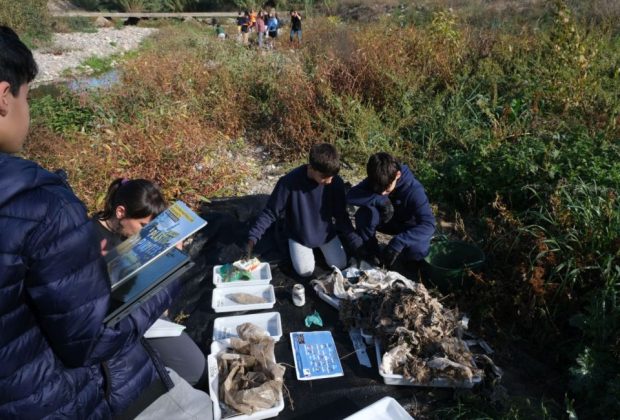Plastic bottles, food packaging and sanitary towels account for 30% of the plastic waste in rivers
Some 750 young people from Catalonia and the province of Burgos (Castilla y León) took part in the European citizen science project Plastic Pirates.

Some 750 young people from Catalonia and the province of Burgos (Castilla y León), divided into 37 groups, took part in the European citizen science project “Plastic Pirates” from 15 September to 15 November 2022. Through sampling in 37 stretches of rivers in the provinces of Burgos, Barcelona, Girona, Lleida and Tarragona, the young people were able to collect data on macroplastics on the river banks, floating waste and microplastics found in the water. Preliminary analysis of this data indicates that approximately 4,600 single-use plastic waste items were found on the riverbank, consisting mainly of plastic bags, food packaging and sanitary towels, representing approximately 30% of all waste found in the stretches of river analysed.
These levels of plastic pollution in rivers are worrying, as Meritxell Abril, researcher at the BETA Technology Centre of the University of Vic – Central University of Catalonia (UVic-UCC) and member of the Plastic Pirates project in Spain, points out that “year after year, waste accumulates in seas and oceans, where it interferes with the development of marine species and the functioning of the ecosystem”, as for example “several studies have shown that plastic bags can be deadly traps for birds and sea turtles”.
The results corroborate the data obtained by other similar initiatives, such as “Pescadors de Plàstic”, which since 2019 has involved more than 1,200 students in Catalonia, the sampling of waste and rubbish on the banks of Burgos rivers through the citizen science project AquaCoLab, or the previous campaigns of the “Plastic Pirates” project in Germany, with data since 2016.
Raising awareness among young people
UVic-UCC’s CT BETA and the University of Burgos, with the collaboration of the Institute of Environmental Diagnosis and Water Studies – CSIC, have promoted the implementation of the “Plastic Pirates” project in Catalonia and in the province of Burgos (Castilla y León). The young people participating in this project are mainly high school students, but also students from associations. Once the samples have been taken, the researchers involved in the project have reviewed and validated the data sent by the participants in order to include them in the database of plastic waste at European level.
The problem of plastic in rivers is a serious environmental and health problem that requires a joint effort by all social actors to solve. “Through the “Plastic Pirates” citizen science project, young people, the driving force for change, become aware of this problem, raise awareness in their immediate environment and also play an active role together with the scientific community by generating scientific knowledge that helps to solve it”, commented Patricia De La Fuente and Antonio Canepa, researchers at the UBU and members of the Plastic Pirates project in Spain.
A European-wide project
The “Plastic Pirates” project was born in Germany in 2016 and is focused on groups of young people from different schools, associations and groups from various European countries. In addition to Spain, Austria, Belgium, Bulgaria, Germany, Greece, Hungary, Holland, Italy, Lithuania, Portugal, Slovakia and Austria are also participating, making it one of the largest citizen science networks aimed at young people in existence today. Young people from these countries learn and apply standardised scientific techniques to analyse streams and rivers for the presence of waste in general and plastic in particular. The data collected by the participants is then reviewed by the scientific community associated with the project and is a valuable contribution to research on plastic waste pollution in European rivers.
Thanks to the funding received from the European Commission – Horizon Europe – in the scope of the “Mission: Restore our oceans and waters by 2030”, all these countries have participated this autumn in a joint sampling campaign where 257 groups of young people (of which 37 were Spanish), have sampled different European rivers.
All the information about the project, including its results, is available on the “Plastic Pirates” project website, which also includes an interactive map where you can locate the sampling points, the information of the participating groups and part of the results contributed by them to the project.
Due to the good acceptance and success of the project at European level, further sampling campaigns are expected to take place in the framework of this initiative in autumn 2023 and spring 2024.
